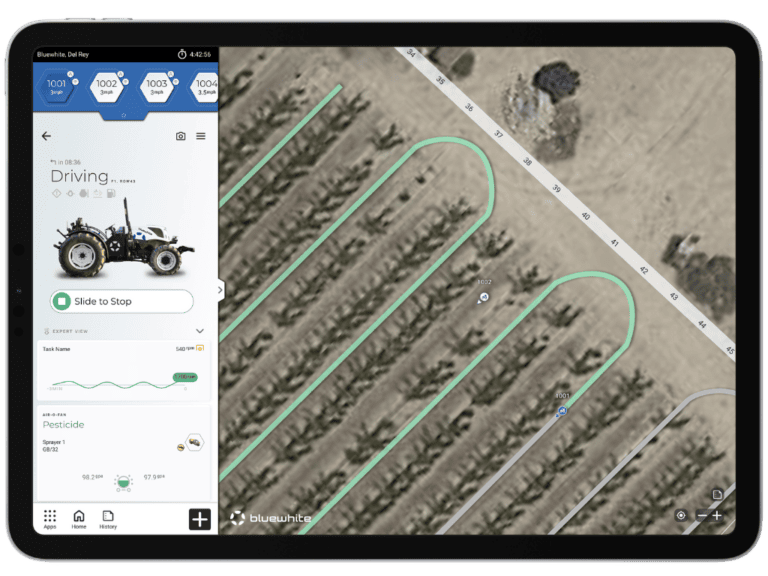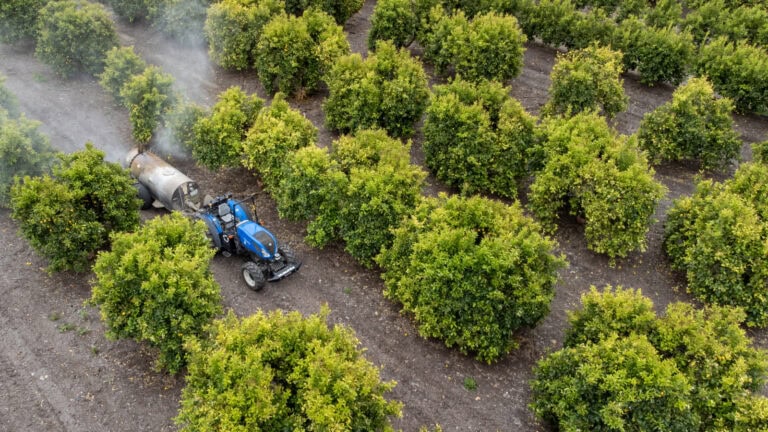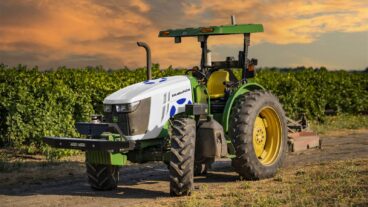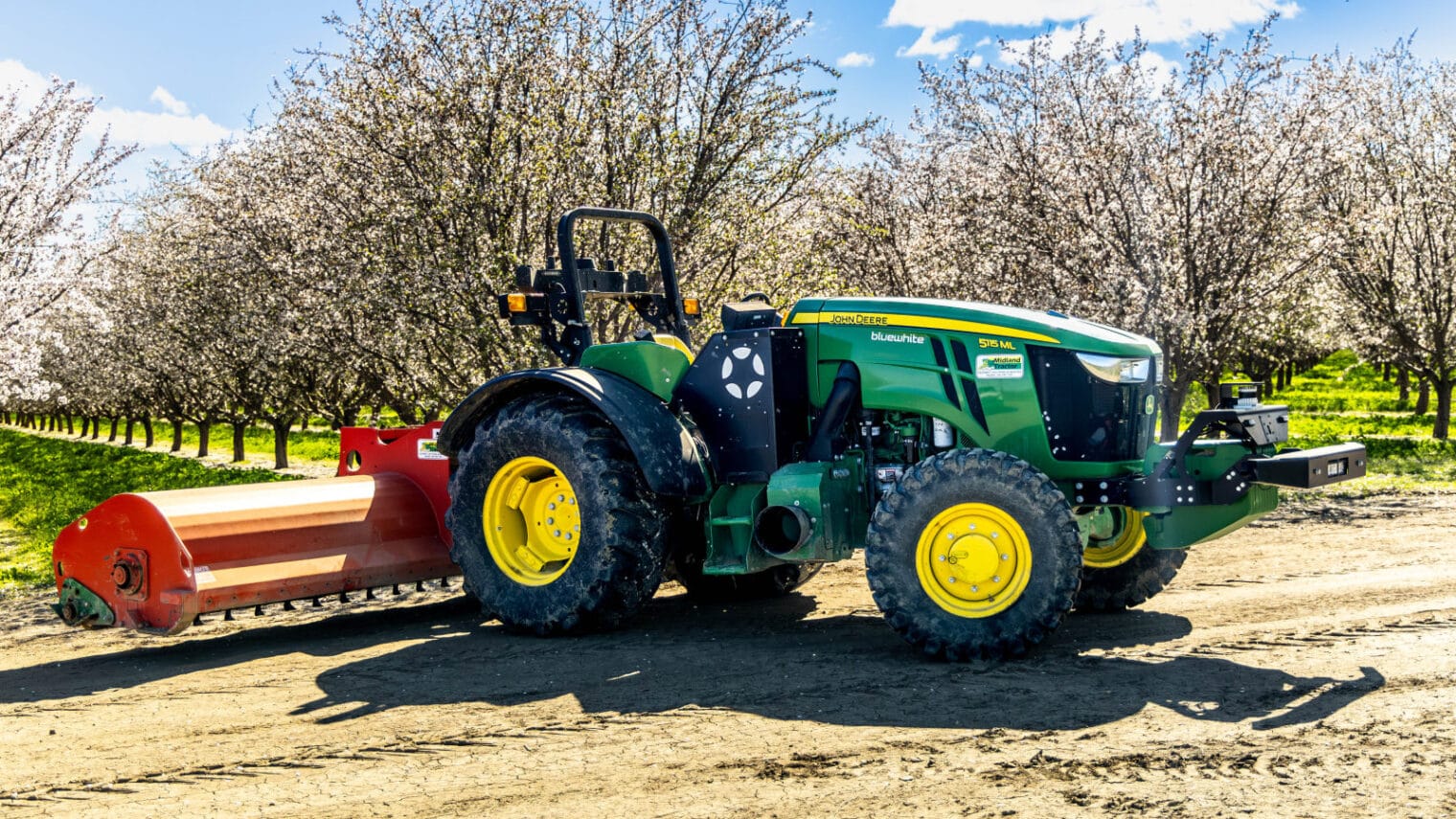No-one wants to drive tractors these days, it seems.
“In the United States, there’s a big problem of scarcity of people who want to drive tractors,” admits Michal Roizman, VP-Product at Bluewhite, an agricultural Robot-as-a-Service (RaaS) company based in Tel Aviv and Fresno, California.

“It’s very boring and hard work: you need to be in the tractor for eight to 12 hours driving very slowly. It’s also not healthy because of the chemicals [released in agricultural spraying]. People don’t want to do that,” she explains.
“At the same time, growers are in very high demand because the world population is growing. We need to create more food, but we don’t have a way to do that because we don’t have enough tractor drivers.”
That’s where startup Bluewhite comes in. The company offers farmers a retrofitted robotics system that turns any tractor into a self-driving vehicle — an ideal solution for growers with a bunch of conventional tractors who now need a fleet of remote-controlled autonomous vehicles.
Remote-controlled fleets
First, tractors are equipped with the Bluewhite autonomous system at the company’s facilities, where the farm terrain is mapped.
Next, the customer success team provides comprehensive training to ensure proficiency in operating, managing and remotely monitoring the autonomous tractors.
This training includes adhering to safety protocols and validating autonomous missions within designated blocks to prepare for daily operations.

“We provide a hardware and a software solution for the existing tractors that the grower already has. We install the hardware and software, and it just transforms the tractor to autonomous,” Roizman says.
Financial advantages
The 150-employee company is already seeing positive results in the market, working with more than 20 large growers in the United States including prominent names in almonds, pistachios, grapes and apples.
Currently, the anticipated value of autonomous tractor technology is projected to soar to $11.5 billion by 2030.
Roizman believes that Bluewhite’s autonomous tractor solution offers significant financial advantages for modern agricultural operations.
One key benefit is the capability for around-the-clock operation. Unlike human drivers who require breaks, shifts and rest periods, autonomous tractors can operate continuously.
This maximizes productivity by ensuring that tasks such as planting, spraying and harvesting can be performed at optimal times without interruption, leading to more efficient use of resources and time.

Another financial advantage, according to the company, is the reduction in labor costs. Labor shortages and the increasing cost of hiring skilled tractor drivers are major challenges in agriculture. Autonomous tractors eliminate the need for a large workforce to operate machinery, reducing payroll expenses.
Additionally, Bluewhite’s solution minimizes the costs associated with training, managing and retaining human operators. This not only lowers direct labor costs but also reduces the administrative burden and associated overheads, Roizman explains.

During the Gaza conflict, Nitza Kardish has been going twice a week to harvest tomatoes, plant zucchini, and tend pineapples in greenhouses along with thousands of other volunteers.
Farmworkers are getting scarce the world over, and the manpower shortage on Israeli farms was already severe before October 7. Most farmers depended on foreign workers, including from the Gaza Strip.
Furthermore, she explains, autonomous tractors can enhance precision and efficiency in farming operations. Advanced software and hardware enable these tractors to perform tasks with greater accuracy, reducing waste and optimizing the use of inputs such as seeds, fertilizers and pesticides. This precision in agriculture leads to better crop yields and improved profitability.
Over time, the investment in autonomous technology can be recouped through these savings and increased outputs, making it a financially sound decision for growers looking to enhance their operational efficiency and bottom line, Roizman notes.
“We can reduce labor costs by 40 to 50 percent, which is huge,” she tells ISRAEL21c.
Bluewhite is currently focused on enhancing precision agriculture and integrating more AI capabilities.
“The sky’s the limit here. You can just add more and more AI capabilities to make the machine work even better,” Roizman says.
“We spent a really long time doing research: actually driving the tractors, understanding what speed you need to drive at and where you need to drive, and how to perform each of the tractor’s functions — mowing, spraying, etc. — in a very accurate way,” she continues.
“Step by step, we’ve perfected the technology in order to provide the best “driver” that can possibly be.”
For more information, click here.

















